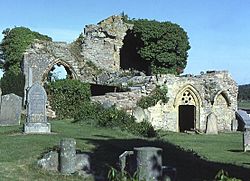Kinloss Abbey facts for kids
 |
|
| Monastery information | |
|---|---|
| Order | Cistercian |
| Established | 1151 |
| Disestablished | 1601 |
| Mother house | Melrose Abbey |
| Diocese | Diocese of Moray |
| Controlled churches | Avoch; Ellon |
| People | |
| Founder(s) | David I of Scotland |
| Important associated figures | Radulf, Robert Reid |
Kinloss Abbey was a large and important abbey in Scotland. It was home to Cistercian monks. The abbey is located in a place called Kinloss, in the area of Moray.
Contents
History of Kinloss Abbey
How the Abbey Started
Kinloss Abbey was founded in 1150. It was started by King David I. The first monks came from Melrose Abbey. In 1174, the abbey received a special approval from Pope Alexander III. Later, in 1187, the Bishop of Moray offered the abbey his protection.
Growth and Wealth
Kinloss Abbey grew to be one of Scotland's richest religious places. It gained valuable rights to fish for salmon in the River Findhorn. These rights were given by Robert the Bruce in 1312. Later, King James I and King James IV renewed these important rights.
Royal Visitors to the Abbey
Many famous people visited Kinloss Abbey over the years. King Edward I came in 1303. King Edward III visited in 1336. Even Mary, Queen of Scots, came to the abbey in 1562.
Famous Abbot: Robert Reid
The abbey had 24 abbots, who were leaders of the monastery. The most well-known abbot was Robert Reid. He brought new ideas about education to the abbey. Robert Reid built a new library and other buildings. He later became the Bishop of Orkney in 1541. After his death, money from his estate helped to found the University of Edinburgh.
What Remains Today
Not many of the original abbey buildings are still standing. The remains of Kinloss Abbey are now in a graveyard. This graveyard is open to the public all the time. The site is protected as a scheduled ancient monument. This means it is an important historical place.
See also
 In Spanish: Abadía de Kinloss para niños
In Spanish: Abadía de Kinloss para niños

